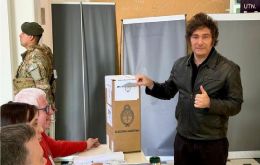MercoPress. South Atlantic News Agency
Argentina
-
Saturday, November 1st 2025 - 10:43 UTC
Argentine Cabinet Chief Francos resigns – Adorni takes over

The 74-year-old Guillermo Francos resigned on Friday as Argentina's Cabinet Chief, effective immediately. He will be replaced by Presidential Spokesperson Manuel Adorni, marking the start of a significant restructuring within the Javier Milei administration following the October 26 midterm elections. Adorni is slated to be sworn in on Monday.
-
Friday, October 31st 2025 - 10:50 UTC
Argentines fighting for Ukraine fall in combat

Three Argentine mercenaries who had been fighting for the Ukrainian Army for over a month have died in combat, according to reports from Kyiv. They were part of a commando unit made up of two other Argentines and one Colombian, who also fell in action during their first operation against Russia, in the Sumy region, northeast of the country.
-
Friday, October 31st 2025 - 10:29 UTC
Argentine-built rifle found in Rio favela gang's arsenal

An Argentine-built FAL rifle was found in the Comando Vermelho (CV) arsenal seized in two Rio de Janeiro favelas after this week's large-scale, deadly raid. In addition, the gang's brutal torture system has been exposed
-
Friday, October 31st 2025 - 10:12 UTC
Argentina strengthens border controls targeting Brazilian gang members

Argentine authorities have reinforced the country's borders with Brazil, in case gang fighters pushed by local law enforcement might intend to escape through any of those crossings, following the controversial raid earlier this week in two Rio favelas.
-
Tuesday, October 28th 2025 - 09:16 UTC
Uruguay welcomes outcome of Argentina's midterms

Uruguay's Economy Minister Gabriel Oddone said on Monday that the landslide victory by Argentine President Javier Milei's La Libertad Avanza (LLA) in Sunday's midterm elections would benefit his country with a more stable neighbor, resulting in a favorable environment for the economy.
-
Monday, October 27th 2025 - 10:55 UTC
Milei's LLA scores landslide, surprising midterm victory

Argentine President Javier Milei's La Libertad Avanza (LLA) on Sunday recorded a surprise victory in the province of Buenos Aires and secured over 40% of the vote nationwide to become the strongest force in the Lower House after Dec. 10.
-
Monday, October 27th 2025 - 09:54 UTC
Javier Milei: “Argentina has left 100 years of decadence behind”

President Javier Milei of Argentina said his country had chosen to leave “100 years of decadence behind” after his La Libertad Avanza Party's victory in Sunday's midterm elections with over 40% of the national vote.
-
Sunday, October 26th 2025 - 21:56 UTC
Argentine midterms uneventful amid poor turnout

Argentina's midterm elections went uneventfully on Sunday amid a poor turnout that left analysts wondering which party lost the most votes. It will not be until 9 pm local time that the first reports from the National Electoral Directorate (DINE) are due.
-
Saturday, October 25th 2025 - 10:58 UTC
Milei's future hangs in the balance at Sunday's midterms

Sunday's midterm elections in Argentina have been deemed crucial for the future of President Javier Milei's La Libertad Avanza and its drastic “chainsaw” economic reforms amid mounting recession and a sharp slowdown despite bailouts from Washington.
-
Saturday, October 25th 2025 - 10:32 UTC
Argentine President meets with JP Morgan CEO

Argentine President Javier Milei met on Friday in Buenos Aires with Jamie Dimon, the CEO of JPMorgan Chase, at a dinner hosted by the bank at the National Museum of Decorative Art, in a high-stakes gathering focused on securing international financial assistance.
